 Water freezes at 32 degrees.
Water freezes at 32 degrees.
That's a FACT we can all agree on, right? Unless, of course, you are using Celsius, in which case 32 degrees is 90 degrees (89.6 for your sticklers) Fahrenheit and -402.07 Farenheit if your 32 was in Kelvin. But water doesn't care, it still turns from solid to liquid at the same temperature – no matter what your opinion of measurement is. It's not the FACT of water changing that is in dispute, it's how you choose to interpret that fact but that does NOT mean that "everyone is entitled to their own opinion" about what temperature water freezes at.
So there can be an absolute fact but there can be endles confusion about how to report the fact and that then leads to many interpretations of what the facts actually mean and the more facts you are using the more complex the interpretations can become – and that's the stock market. Not only are the measurements used by Economorons always in flux but there is even the added challenge that we don't have consistent measuring tools.

Companies do have real value – it is just distorted through so many lenses that most people think it's difficult to determine as, not only do you have to adjust for current business measurments, currency fluctuations, taxes, etc. but you also have to determine if the past is directly comparable to the future and you then have to predict the future for the company, which means predicting the future of their particular sector and perhaps the overall economy locally, nationally and globally.

- LOW made $1.36 per share for the quarter, which was 0.01 better than expected but Revenues were "only" $17.39Bn, missing by $300M as same-store sales rose only 2.2% vs 3.2% expected. They also raised their guidance to $5.70 per share for the year from $5.63, that's up 0.07, which is 1.2% more!
- HD, on the other hand, fell 5% yesterday as earnings were "in-line" at $2.53 per share for the quarter and Revenues were "only" $27.2Bn, missing by $290M and same store sales rose only 3.6% vs expectations of 4.6%. Their guidance was flat at $10.03 per share.
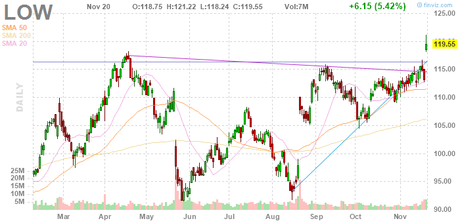
But those conditions may change over time. Cheap Chinese lumber used by Lumber Liquidators (LL) for example, has been subject to a 25% tariff this year, that's helped LOW and HD maintain their margins on lumber. Tax rates have been favorable with HD paying $3.4Bn (23%) on $14.5Bn in 2018 vs $5Bn (36%) on $13.7Bn in 2017 so almost 100% of their $1.5Bn increase in earnings came from tax breaks, not growth.
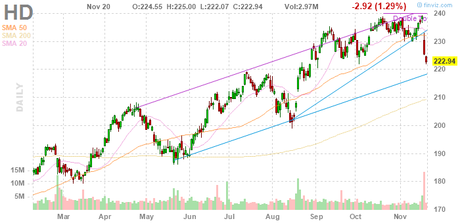
You can use the AI at WolframAlpha to (sometimes) find the historical p/e of a company and you can see on this chart that HD's p/e ratio, for example, has fluctuated between 17.17 and 28.62 over the past 5 years but, oddly enough, the high and the low came just one year apart from each other:
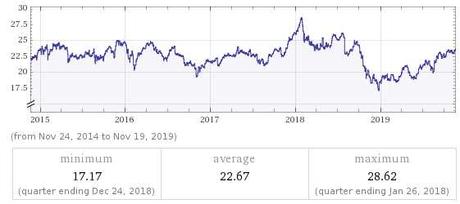
Notice HD's improving stock price is mainly a function of the 25% increase in the p/e ratio since March, not because they are particluarly earning more money or have better prospects – just better sentiment…
Just imagine that's a chart for what temperature water freezes at or what you are worth as an employee on a monthly basis. 11.45 is 66.6% of 17.17 – that's a HELL of a variation, isn't it. In fact, that's about the "normal" range of value uncertainty that stocks experience over a 5-year period. There are no perfect valuation models but, given that FACT, we can then determine the best strategy for selecting stocks is when they are low in their valuation channel (providing we still think they have good future prospects) and ignoring them when they are high. Whichever one you are hoping for, your stock will get there eventually.
Here's Macys (M), which we picked in our Hemp Boca Portfolio and our Earnings Portfolio yesterday:
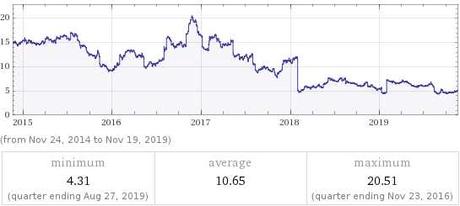
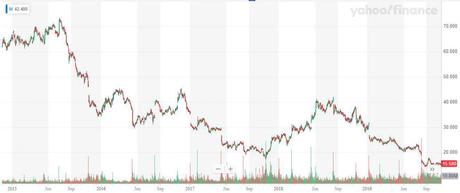
Yes, Macys is making 33% less money than they made in 2015 but that money is also being valued 1/3 as much in the p/e ratio – that's led to a devastating 78.5% decline in the price of the stock but did it really change the VALUE of the company by that much? Probably not. So there are two ways to win with M: #1 is that they simply make more money and even with the current 6x price/earnings ration the stock would rise. B is that sentiment changes and the p/e moves towards a more reasonable 10x earnings – even 8 would be a 33% bump in the stock price – silly as that may seem.
So remember what Einstein taught us – everything is relative and, while there are indeed FACTS in the universe – we are all observers of those FACTS, looking through our own lenses, which may be nothing like the lenses others are using to observe the same FACTS and our conclusions from observing those FACTS are also clouded by our own systems and beliefs – leading two intelligent people to reach very different conclusions about something that is absolutey true – whether it's the freezing point of water, the value of a stock or the guilt of a President.
Keep that in mind next week when you gather with your family to argue about the best way to carve a turkey…
Do you know someone who would benefit from this information? We can send your friend a strictly confidential, one-time email telling them about this information. Your privacy and your friend's privacy is your business... no spam! Click here and tell a friend!

